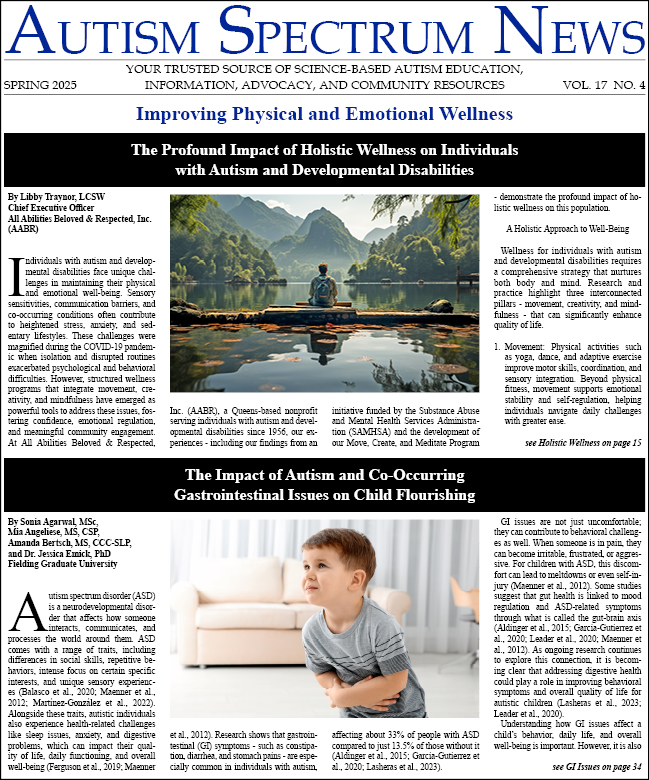-
Psychiatric Hospitalization and ASD
Admission to a psychiatric inpatient unit can have varying outcomes for a patient. The success of the admission is determined by the patient’s ability to function after discharge. During the course of treatment, it is important to prepare the patient for life after hospitalization. All members of...
-
The Importance of Resolving Psychosocial Stages for Adults with ASD Who Have Committed Criminal Acts
A majority of adults with an Autism Spectrum Disorder (ASD) do not commit criminal acts. Those adults with autism who do commit criminal behavior represent about 1.5% of all individuals with an ASD (Ghazziudin & Ghazziudin 1991) to 2.3% of all individuals with an ASD in special forensic...
-
Evidence-Based Practices for Autism Spectrum Disorder: Making the Best Treatment Decisions for Your Child
The rise of wide-ranging treatment approaches for Autism Spectrum Disorder (ASD) has provided parents with the ability to construct an individualized approach to best suit each child’s unique needs. However, sorting through all of these options can become overwhelming for many of the families...
-
Positive Psychology in Autism Spectrum Disorders
Using a positive psychology approach in working with individuals with an autism spectrum disorder can help them lead a fuller and a more enriched quality of life. Optimism, resilience and kindness are some of the key traits at the core of positive psychology. Through positive psychology, we can...
-
An Interdisciplinary Treatment Program in the School: A New Model
From our vantage point in 2012 there is nearly unanimous agreement among the scientists who study autism, that it is really many diseases, and some have suggested that we call it the “autismS.” Along with the three key diagnostic signs (language and social disorder as well as a rigid adherence...
-
Evidence-Based Interventions for Students on the Autism Spectrum
The Individuals with Disabilities Act (IDEA) and No Child Left Behind (NCLB) legislation both demand that schools utilize scientifically supported, evidence based methods. Yet, outside of applied behavior analysis there are few well-designed studies supporting interventions for our students on the...
-
From Assessment to Intervention: Strategies for Identifying and Monitoring Treatment Progress in ASD
Evidence based treatment and the assessment of treatment effectiveness are dependent upon the collection of data during the evaluation process providing information about symptoms, impairment and abilities in children with ASD. Such an assessment allows for a seamless transition from diagnosis to...
-
It Starts with Feelings: Supporting Emotion Regulation and Mental Health in Young Children with ASDs
As part of comprehensive ASD treatment, the overarching goal that must be kept in sight for all learners is a healthy quality of life. This approach to intervention begins at the moment of diagnosis or before, and continues far into late adulthood, the frontiers of which we currently know little...
-
Steps to Empower Families to Access Early Intervention
In my six years as Autism Resource Specialist in the Center for Children with Special Needs at Floating Hospital for Children in Tufts Medical Center in Boston, I have met with hundreds of families in the moments after their young child receives an autism spectrum disorder (ASD) diagnosis. Although...
-
Early Intervention Services for Toddlers with ASD
Receiving an Autism Spectrum Diagnosis (ASD) can be an extremely stressful family event. Once the reports are read it may help to put them away for future reference and begin to focus on intervention. The shift from feelings of helplessness during the diagnostic process, to feelings of hopefulness...





